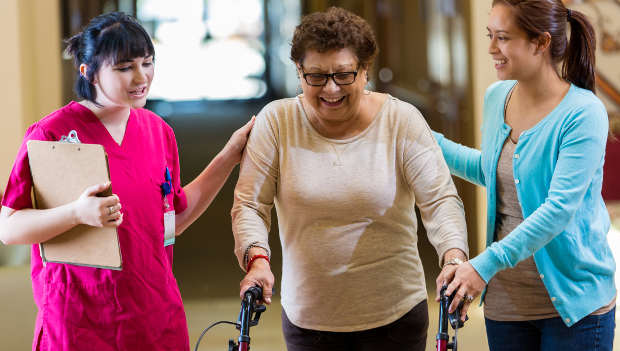As health researchers, our time is now

Kaiser Permanente’s 4 beliefs connect us to a transformative movement, writes Dr. Eric B. Larson
by Eric B. Larson, MD, MPH, Kaiser Permanente Washington Health Research Institute (KPWHRI) executive director, and Kaiser Foundation Health Plan of Washington vice president for research and health care innovation
In 16 years at our institute, I’ve always felt that our researchers are among the most purpose-driven groups of people one could ever meet. Since joining them in 2002, I’ve been proud to help lead our institute’s work to improve health and health care through leading-edge research, innovation, and dissemination embedded in a nonprofit, integrated health care system.
Like many, I believe our country’s health care crisis can be solved only by aligning financial incentives to best serve patients, their families, and their communities — versus making big profits for insurers, providers, and drug companies. Putting patients first is what health care systems like ours are built to do.
In 2016, when Kaiser Permanente began the acquisition of Group Health, I saw how our work could soon become part of an exciting nationwide movement that would fulfill our model’s potential. I was invited that December to a Kaiser Permanente Leaders’ Summit in Oakland, where CEO Bernard Tyson described the organization’s “ambition to transform health care in America.”
Commitment to change what’s unacceptable
Bernard and other Kaiser Permanente leaders did not minimize the difficulty ahead. America spends more on health care than any other nation, but it ranks low in quality outcomes, they said. Care is unaffordable and inaccessible to many — a current state they deemed “unacceptable.” They then put a stake in the ground and now invite other Kaiser Permanente staff to join them. Together we are committing to “a movement” to change American health care for the better over the next 10 years. Our mission: “To provide high-quality, affordable health care services to improve the health of our members and the communities we serve.” Our vision: “To be trusted partners in total health, collaborating with people to help them thrive, creating communities that are among the healthiest in the nation and inspiring greater health for America and the world.”
By now, most of our faculty and staff have read about the movement Kaiser Permanente is creating and the four beliefs that drive it. I imagine that, like me, many recognize these beliefs as their own:
- We believe that life, liberty, and the pursuit of happiness require total health — and that includes equal access to high-quality health care for all.
- We believe that total health is more than freedom from physical affliction — it’s about mind, body, and spirit.
- We believe that health care must be affordable for all — because thriving individuals, families, and communities require that.
- We believe in a healthy and engaged life — with good beginnings and dignified endings.
We intuitively understand that our researchers’ work contributes to this movement and Kaiser Permanente Washington’s corresponding strategies. In a brainstorming conversation about this at our recent faculty meeting a few weeks ago, the energy was high and expectant. Our researchers pointed to ways our work has long been aligned with this agenda — and how we hope to expand it in the future.
Examples include our current work to reduce low-value health care services and to better integrate behavioral health services, including help for people with alcohol and opioid use disorders, into primary care. We’re continuing our commitment to work with health care teams to design and share innovative models of primary care inside and outside our system — including with safety net providers serving disadvantaged populations. And we’re partnering with community organizations nationwide to plan, assess, and evaluate what works to improve health for all.
Using research to accelerate regional priorities
We’ve also launched a new Learning Health System (LHS) Program led by KPWHRI’s Dr. Paula Lozano, Katie Coleman, and Emily Westbrook. With significant new funding from Kaiser Permanente Washington, their team is partnering with care-delivery leaders to leverage the Institute’s research capabilities to accelerate work toward high-priority strategic efforts. By supporting continuous learning across the organization, the LHS Program aims to enable more rapid implementation of scientific findings and evidence-based treatments into clinical practice — so we can continually provide better care to our members.
Through this and other programs, our researchers are eager to keep sharing their expertise in areas such implementation science, social determinants of health, predictive analytics, telehealth, and more. We hope to help Kaiser Permanente Washington use its vast data resources and machine learning to predict health care needs and to personalize treatment to individuals. Looking to the future, such efforts can be part of Kaiser Permanente’s aim to deliver the right care to patients at the right place and the right time. This work can also be part of our collaboration with clinical leaders striving to make care more affordable by reducing unwarranted clinical variation and promoting better resource stewardship.
We aspire to be at the leading edge of Kaiser Permanente’s work as it infuses health research into efforts to drive healthy outcomes — not only for our members — but for people throughout Washington state and nationwide. For many of us, it’s the kind of mission that attracted us to health care research in the first place. And it’s a mission that will inspire us for many years to come.
Learn more about Kaiser Permanente Washington Health Research Institute. Sign up for our free monthly newsletter.


